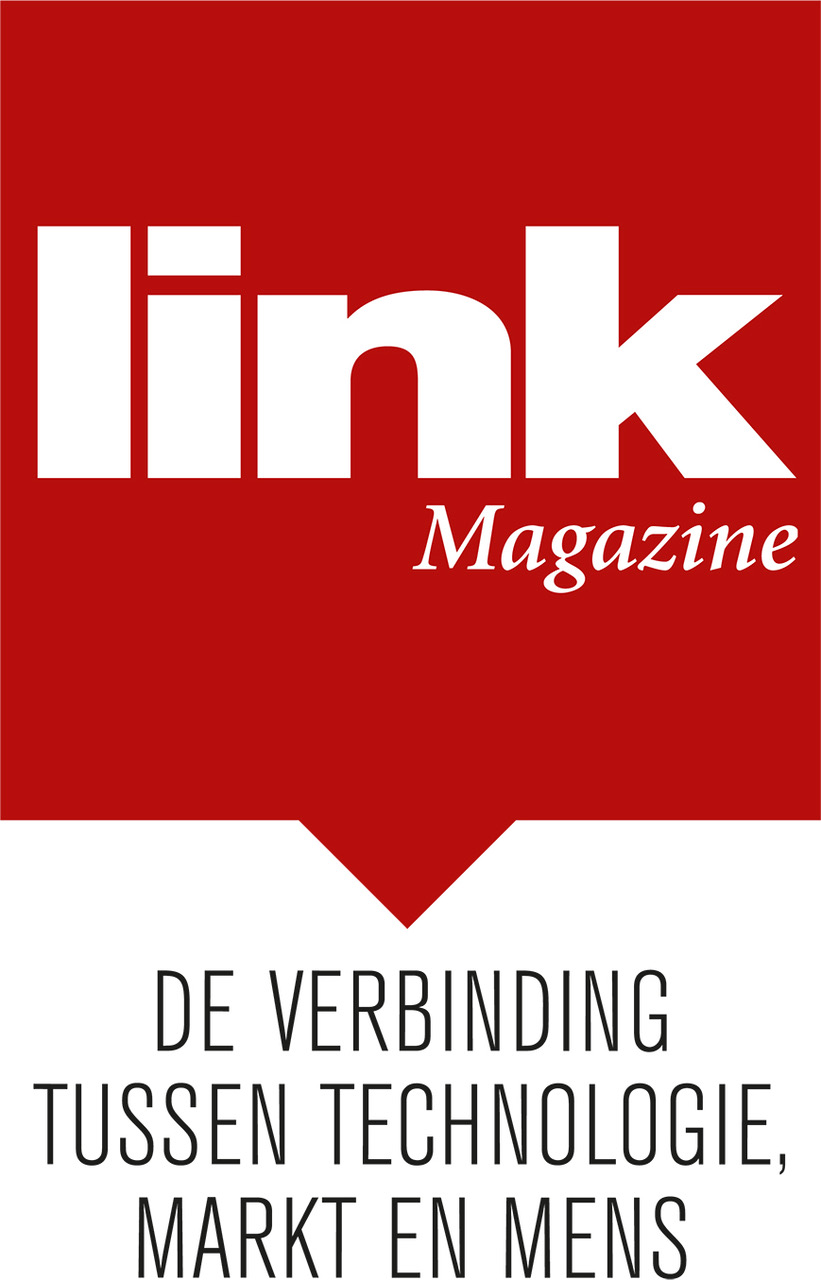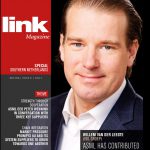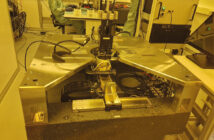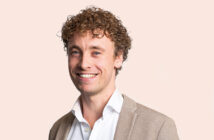For more than fifty years passenger cars have been built in Limburg, all in all more than five million by now. While the requirements of the automotive industry have changed dramatically in that half century, Born still proves to be a good location for the automotive industry. Paul van Vuuren and Jan Tulkens, board members of VDL Nedcar, explain and look ahead at a currently diffuse future.
IMPRESSIVE HISTORY, CHALLENGING FUTURE
- The VDL Nedcar plant in Born excels in flexibility.
- Often several models are built together at the same time.
- Efficiency improvement is constantly monitored.
- The current uncertainty in the automotive sector has put a provisional end to a period of strong growth, also in Born.
When you drive on the A2 to VDL Nedcar, you will see a high green wall looming shortly before the Born exit. It turns out to be a huge distribution hall. VDL Nedcar has recently made grateful use of the many square metres of storage space, to build up a stock of parts large enough for about five to six weeks of production of the Mini One and the Mini Countryman in anticipation of a hard Brexit. The parts come from British suppliers located around the BMW site in Oxford. The car production plant in Limburg has been specially set up to provide the extra capacity required at any given time for these and other models. Jan Tulkens, executive vice president responsible for the production final assembly, sums up the added value of VDL Nedcar: flexibility.
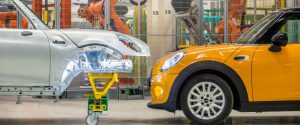
VDL Nedcar
Split production
It is precisely the reason why BMW signed a contract with VDL Group in 2012. Briefly before that, VDL Group had acquired Nedcar; initially only for the production of the Mini One, now three other Mini models and the BMW X1. ‘BMW wants to be able to continuously change models and personalise a car as much as possible, according to the wishes of the individual customer. And working on demand, on the order of the customer. BMW also wants a plant where it can build many different models, for split production, if the capacity of a dedicated plant elsewhere is fully utilised. This plant in Born has shown great flexibility over the years.’ Since 1967, 25 different models of different makes have been built on the line. From DAF and Volvo to Daimler, Mitsubishi and now BMW. ‘And often several models at the same time. A large part of this flexibility comes from the quality of the people in this region, who are infused with a down-to-earth, no-nonsense mentality. Together they roll up their sleeves.’
Well thought-out logistics
In order to make the best possible use of this workforce, VDL Nedcar has a well thought-out system whereby employees with specific qualities are on the line exactly where those qualities are required at that particular moment. ‘For example, due to the lack of a load-bearing roof construction, the Mini Convertible is a more complex car to build. When a number of these vehicles are on the line, specialists are deployed at specific locations. We call them butterflies.’
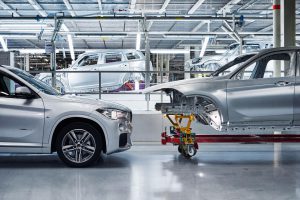
Foto: VDL Nedcar
‘The main concern is to get global production capacity where it is most needed at the time’
And what applies to the workforce applies equally to components and modules that have to be installed. The company does not only want to be in full control if there is a chance of a hard Brexit, but every day of the working week. ‘For this reason, we already take over responsibility for components and modules from the supplier. We provide the transport and keep track of all lorries online. If a lorry breaks down somewhere or if a driver has to take a break, we make sure that a smaller lorry quickly picks up the instantly required delivery.’
And that can sometimes be a long haul. ‘BMW wants its suppliers to be as close as possible to its own dedicated production plant. At the same time, our client wants to work with single source as much as possible. For us, this means that we have many suppliers in Eastern Europe who primarily supply the BMW site in Regensburg. Or in Oxford.’ The trailers arrive in Born no more than two days before the cargo is needed for production. To be unloaded exactly at the part of the line where the parts in question are used. ‘Just in time and just in sequence’, as Tulkens defines the method.
Ist and Soll

Foto VDL Nedcar
In addition to flexibility, car construction must of course also be carried out at the lowest possible cost. For this purpose, VDL Nedcar gratefully draws on more than fifty years’ experience, says CEO Paul van Vuuren. ‘BMW does not just want us to build its cars, but also to learn from us. Here we still use the skills acquired during the time when this factory was owned by Mitsubishi. We are familiar with Japanese management strategies such as six sigma and kaizen. With the Ist model of continuously improving the current situation. We now combine this with the German Soll model, focused on how it should be. We want our preparation to be very thorough, with the intention of then producing flawlessly. But because that is of course a utopia, it is very useful that we also know exactly how to minimise the errors by means of continuous improvement.’
61 seconds
In this way, the requirements of both flexibility and low costs can be met. ‘Over the past four years, we have succeeded in achieving an annual efficiency improvement of 3 to 5 percent. Actually, by making the best possible use of the production capacity. We develop quality to a first time right of 75 percent or more, with a cycle time of 61 seconds. Exactly every 61 seconds a car comes off the conveyor belt’, says Tulkens with barely concealed pride.
To further colour in this performance, Van Vuuren indicates that at the same time the complexity of the cars is increasing by the year: ‘Modern cars contain 15 to 20 percent more components than those of twenty years ago. But the components are also much more complex. Many of these components contain CPUs and embedded software that must be properly programmed at the end of the line, depending on the specifications of the model in question. A complex process with a corresponding risk of errors. Just to download a software-based car radio and get it properly programmed, we had to add five workstations of 61 seconds process time each to the line’, the CEO explains. ‘In the coming years, a better utilisation of the enormous amount of big data that the plant produces must result in further process improvement steps.
Four concerns
It must contribute to VDL Nedcar being able to look forward with confidence to a currently uncertain yet demanding future. Uncertain not only because of the Brexit and the trade conflicts between the US, China and Europe, but also because of the electrification of the car. ‘The most important concern of OEM management at the moment’, says Van Vuuren, ‘is to get global production capacity where it is most needed at the time. The threat of import tariffs comes after that. So, OEMs are now reluctant to invest in new plants until it is clear to what extent capacity needs to be built in the country where the market is, to avoid levies. The third concern is the Brexit and the fourth the electrification and everything that goes with it.’
New business model
With the latter he refers to the need for OEMs to work out a new business model, whose outcome will certainly affect VDL Nedcar. ‘An electric car has a much simpler drive train. What does this mean for all OEM engine plants? It means less work, and the question is whether it will still be accepted if production work is outsourced elsewhere – here in Born, for example.’ Moreover, it is still unclear which electrical drive systems will prevail: hybrid systems, battery-powered or those equipped with a fuel cell? In addition, electrification – in this case, the conversion of a car into a ‘driving laptop’, as Tesla executive Elon Musk once put it – makes the step towards autonomous driving easier.
‘All this makes it possible for completely new players such as Google, Polestar and Lightyear to join, who will probably not sell cars, but kilometres. Your car will then be in an app on your smartphone with which you can order the car you need at that moment in no time’, says Van Vuuren, who is not immediately afraid of collapsing demand if the shared car gains popularity. ‘The global population will continue to grow in the coming years. A population that is also becoming more prosperous with a continually growing demand for mobility. One day the demand for cars will decline, but not in the next few decades.’
Growing pains
The current uncertainty in the automotive sector has put a provisional end to a period of strong growth, also in Born. Last year was the fourth year in Nedcar’s history in which more than 200,000 cars were produced. In the second half of 2014, the year in which production for BMW started, that number was ‘only’ 30,000. A very rapid ramp-up indeed, which was only possible by increasing the number of staff accordingly: from 1,450 in 2014 to 7,200 last year. This number has now dropped by more than a thousand people after BMW announced production cuts last autumn. In Born, this decline was anticipated by building up a flexible staff complement. Relieving the growing pains that are still felt requires much more energy from Paul van Vuuren.
Attention to HR
‘Such rapid growth, with so many new people in such a short time, from the Netherlands but also from Germany, Belgium, Poland, even Syria – there are 67 nationalities here – causes miscommunication and tensions in the workplace. At the same time, this organisation had to become much more commercial and get used to the idea that it is no longer a well embedded subsidiary that can ask the parent company for extra budget to make up for any deficits. This is a vehicle contract manufacturer, who has to serve its customer optimally at the lowest possible cost’, says Van Vuuren, explaining why he currently pays a lot of attention to HR matters. This involves a new assessment system, establishing clear consultation structures, setting up leadership and talent management programmes, convening round table meetings, etcetera. ‘Very important, because ‘culture eats strategy for breakfast’, he says, quoting the American consultant Peter Drucker, whose quote was made famous by Mark Fields, former CEO of Ford.
Second OEM
However, VDL Nedcar does not have to weather the turbulence in the global automotive industry all by itself, as the company is of course part of the VDL Group. Jan Tulkens says, ‘With companies such as VDL Steelweld, VDL Enabling Transport Solutions and of course VDL Bus & Coach on board, we possess a great deal of knowledge of building vehicles, including electric ones. It’s not for nothing that for three years we have been joining the BMW designers before each production start of a model.’
The current contract with BMW ends in 2023. Paul van Vuuren and Jan Tulkens are confident that the partnership with BMW will be extended. Nevertheless, contacts are ongoing with other potential clients, including in China. ‘It would be nice if we could soon serve a second and a third OEM. Not necessarily with the construction of a complete car. We are also already diversifying, for example by offering the construction of a complete module. We must safeguard our independence and hence our future.

Wim van der Leegte, former ceo of the VDL Group (Left) together with his son Willem van der Leegte ceo VDL Group. Foto: Bart van Overbeeke
An automotive and bank man
Board member Jan Tulkens is a real automotive man who has been working at Nedcar since 1982, with a ten-year break at roof systems supplier Inalfa. Paul van Vuuren has worked in the sector for the first time since starting in December 2017. However, he was not a stranger to this sector. The former ING man was for years the financial sounding board to former VDL president Wim van der Leegte as chairman of the ING region Oost-Brabant and in that role closely involved in the acquisition of Nedcar by VDL in 2012. At the same time, he led various reorganisation processes for ING. So Wim van der Leegte’s request to him to take on the role of CEO of VDL Nedcar was a logical one. ‘Paul is the mediator and motivator we need to take VDL Nedcar, together with our colleagues in Born, to the next phase’, says president Van der Leegte, explaining the appointment.
